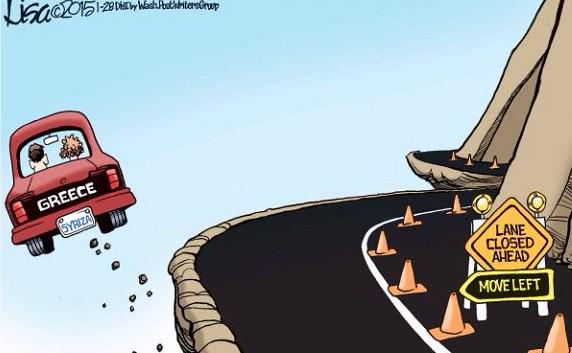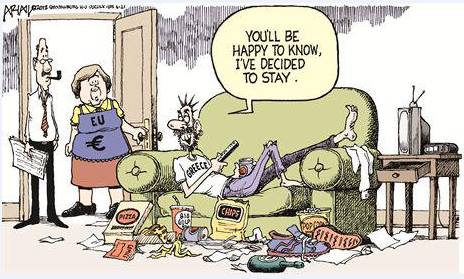A cartoon by Dimitris Hantzopoulos in which he presents his interpretation of yesterday's cover of the Economist
The first actions of the new Greek cabinet are some of the most debated topics on the social networks. After the initial flood of tweets and status updates regarding the electoral victory of SYRIZA, the subsequent formation of a cabinet involving the Independent Greeks party has also become the subject of discussion, but no less of analyses similar to that in the profile of honorary Professor of Philosophy Dimitris Dimitrakos entitled "Dangers of populism". He writes,
"Today's populism has very little in common with the farmers’ movements of the 19th and 20th century in various countries in Europe and America or with the sentimental romanticism towards a certain idea of "the people". Modern populism in Europe finds expression in any political movement or party that is directed against institutions in the widest sense - against adopted laws, but also against principles of democracy, the idea of law, meritocracy and against any institution which is an obstacle to the imposition of any will of "the people".
Populism manifests itself in various forms and uses different symbols and rhetoric. In its modern, postmodern form, it is able to freely combine slogans and thoughts that belong to the pre-war communist rhetoric with symbols associated with nationalism, isolationism, opposition to globalisation, Euro scepticism, xenophobia.
Most often, populism is a product of common anger that is usually provoked by economic and other reasons, but which does not find a single theoretical expression in a particular ideology. The dangers due to contemporary populism in the European Union have been often presented, mostly by The Economist magazine. Parties and movements with "left" rhetoric such as Podemos in Spain or SYRIZA in Greece or others with "right" disposition such as Independent Greeks in Greece or the National Front in France have a common starting point and it is the wrath of societies over the impotence of traditional parties to institutionally handle the new issues posed by the complex international reality, namely mass immigration flows from poorer and authoritarian societies to more prosperous and democratic ones, the crises caused by smaller or greater crises in the world economy, the clashes between different national identities (as is happening in Ukraine).
Populism offers easy "solutions" to these intense and very complex problems, suicidal or, in the best case, just misleading and void "solutions" while resorting to isolationism.
They postpone for tomorrow the consequences of the lack of solutions to the detriment of those who will come after them. For them there is only today, there is no tomorrow. The bad thing in terms of populists is that universality of dependencies (which we call globalization) leads to tomorrow much faster than they expect. And tomorrow is usually much more terrible than they have imagined."
The left turn taken by Greece on Sunday (although an extreme right party is the government partner of SYRIZA) has inspired cartoonists both in Greece and abroad.

Greece may not disrupt the consensus of the European Union foreign ministers regarding the continuation of the sanctions on Russia but the response of Athens to the opinion of Federica Mogherini on Monday and the publications on the links of new Minister of Foreign Affairs Nikos Kotzias with Russian nationalists have created a well-founded fear of a sudden change in Greece’s geopolitical orientation.
"While SYRIZA was the sympathetic new party with the young leader who wanted to change the policy of austerity in the euro zone and eventually to break it, the international media were looking favourably on the party and everything was fine.
The shady dealings with Putin and his state within the state, the threats to veto an issue of major geopolitical importance to the West, the congratulations by Hamas and the partnership with a marginal party that advocates conspiratorial anti-Semitism have spoiled the "sweet" image, putting it in the negative category.
The situation has changed since yesterday. You just do not play with some things."

"You’ll be happy to know, I’ve decided to stay," says Greece, presented as the lazy-bones of its parents, the European Union.
At the same time, many users have noticed that some positions of the government have apparently changed within the course of just a few days.
"What a change can happen in Greece in a day. The ministers have stopped talking about new measures, and the Minister of Foreign Affairs has not blocked the resolution of the European Union for Russia."
And, "There is an interesting change in the tone of the government-friendly Greek media: They have upgraded the status of the euro area from "loan sharks" to "partners".
"Why not create an autonomous region in Greece to be governed by the pro-European, liberal forces and mainly by the forces of sanity, after the example of Mount Athos or the region of Exarcheia in Athens?" a Twitter user asks with frustration because the specific ideas are highly underrepresented in the new Greek Parliament.
And as a final course, a call by writer Apostolos Doksiadis on Twitter,
"To Greeks and non-Greeks: Currently there is nothing more dangerous for Greece than binding its fate to symbolism."